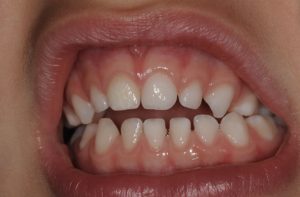The effects of thumb sucking and pacifier use.
Most parents get concerned when they see their infant or toddler sucking their thumb or 
Nonnutritive sucking has many benefits as it helps infants in their ability to manage emotions, helps them relax and provides comfort and security. Sucking tends to occur more often when the child is tired, anxious, or upset.
It has also been cited that the use of a pacifier has been shown to decrease the incidence of Sudden Infant Death Syndrome.
When to worry
The dental effects of nonnutritive suckling correlate to the magnitude, frequency, and duration of the habit. The most common effect is the movement of the central incisors resulting in an anterior open-bite as seen below. Nonnutritive sucking habits can also result in maxillary constriction, resulting in a posterior cross-bite. Dental effects are generally reversible before the age of 3
Stop Thumb Sucking Before Age 3

Baby Pacifiers vs Thumb Sucking
Several articles showed that the use of a pacifier beyond the age of 3 has an increasingly harmful effect on the developing dentition when compared to a digit (finger). The most notable changes are an increase in the prevalence of an anterior open bite, posterior cross bite, narrow intercuspid width of the maxillary arch, and a high narrow palate. According to the most recent publication of the Journal American Dental Association, “Pacifiers were associated with a higher risk
of developing most malocclusion features when compared with digit (finger) sucking.”
For more information on thumb sucking or pacifier use, or to schedule an appointment, please contact Growing Smiles in Floral Vale at 215-860-9808 or